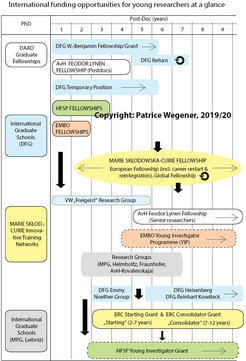Introducing 'active career development'
1. Active career development for 'young researchers'
The funding landscape for the young researcher is more comprehensive and structured than ever before. Funding programmes offer to the PhD student or to the early as well as experienced 'young' Post-Doc - who makes intelligent use of these instruments - ample opportunities for active (international) career development. A first experience gained during the PhD or early Post-Doc phase may, for example, serve as a spring board to the very competitive early independent research team funding. These prestigious programmes represent a fast track chance to a later full independent position at university or in a non-university research organisation that the talented young researcher should not miss out.
Another important area of research funding is collaborative research. Young scientists wishing to successfully initiate or access European research networks or join established project consortia may refer to the "How to start collaboration" section for further information and advice.
2. Defining the 'young researcher' phase
Who is eligible?
National and international individual funding programmes basically distinguish between the PhD and the Post-Doc phase. Age restrictions have been completely removed and replaced by the scientific seniority.
PhD funding is mostly "structured", i.e. offered within national or international graduate schools. Candidates apply directly to the hosting graduate school of their field of interest. The "structured" training usually comprises an individualised PhD project, a variety of training courses, personal tutoring, and - in the case of international schools - mid or long-term stays at the partner or single host institution abroad.
The main feature of Post-Doc funding is the bottom-up approach, i.e. applicants submit their individual research project and topic to the funding programme. The required scientific seniority is mostly defined by the number of actual Post-Doc years.
Most funding programmes distinguish between two stages of "young" postdoctoral researchers:
(a) Early Post-Docs (0 - 2 or 3 years) will typically resort to long-term Fellowships (DFG, HFSP, EMBO, AvH) that allow to gain a first postdoctoral experience.
(b) Experienced 'young' Post-Docs (~3 - 9+ years) will have access to funding that offer to establish or consolidate early independence by setting up and leading a research project orientated team (e.g. Emmy-Noether, ERC Starting Grant). These programmes require that candidates produce a first proven track record (i.e. at least one major independant publication or paper, awards, funding ID) that allows to appreciate the candidate's long term potential for scientific excellence.
Funding programmes generally suggest by their access conditions that the "young researcher" phase does not exceed 8 or 9 years of Post-Doc experience or the gaining of full scientific independence (e.g. by a tenure position). The recent extension of the ERC Starting Grant's eligibility period to 12 years is a rare exception to this rule.
The Marie Sklodowska-Curie actions' definition of the 'early stage researcher' differs significantly. It includes those researchers who have gained up to 4 years of (full-time equivalent) research experience since their graduation AND who have not yet obtained their PhD. Otherwise they are considered as "experienced researchers".
The Marie Sklodowska-Curie Individual Fellowship is open to "experienced researchers" at any stage of their career.
3. Funding programmes at a glance

How is the individual funding landscape organised?
The below diagram sketches and classifies the most common funding instruments for the different stages of young researchers. It should allow a quick grasp of opportunities for active career development.
For example, long-term fellowships from EMBO or HFSP are open to Early Post-Docs with a maximum of 3 years of Post-Doc experience (application deadline). In contrast, experienced 'young' Post-Docs accounting for 2 to 12 years of Post-Doc experience will be able to apply for an ERC Starting or Consolidator Grant from the EU (bottom of diagram). At last, experienced researchers, e.g. with more than 10 years of Post-Doc experience, may, like their younger postdoctoral peers, also apply for a Marie Curie Individual Fellowship.
Further Information on the funding programmes are available at the following sections or links:
- EU research funding at a glance
- A comparative study on Marie Curie researchers and their long-term career development
- Max Planck in-house training sessions for young researchers
- How to get started with EU collaborative research
